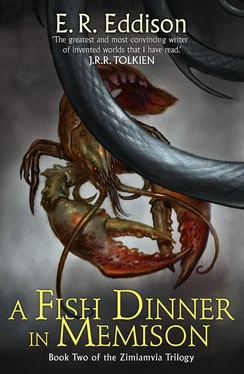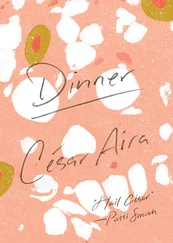II
MEMISON: KING MEZENTIUS
COMING now beyond the lawn, that lady paused at the lily-pond under a shade of poplar-trees: paused to look down for a minute into depths out of which, framed between the crimson lilies and the golden, looked up at her, her own mirrored face. The curves of her nostrils hardened: some primal antiquity seemed suddenly to inform the whole presence of her, as if this youth and high summer-season of her girlhood were, in her, no season at all: not a condition, bearing in its own self its own destiny to depart and make place for future ripenesses, of full bloom, fading and decay; but a state unchanging and eternal. Her throat: her arm: the line of her hair, strained back from the temples to that interweaving of darkness with sleek-limbed darkness, coiled, locked, and overlaid, in the nape of her neck: the upward growth there, daintily ordered as black pencillings on the white wings of a flower-delice, of tiny silken hairs shading the white skin; her lips, crystal-cold of aspect, clear cut, red like blood, showing the merest thread-like glint of teeth between; these things seemed to take on a perfection terrible, because timeless.
The lord Chancellor Beroald, from his seat beneath an arbour of honeysuckle leftwards some distance from where she stood, watched her unseen. In his look was nothing of that worship, which in dumb nature seemed: rather an appraising irony which, setting profession beside performance, fact beside seeming, sucks from their antic steps not present entertainment only, but knowledge that settles to power.
‘Is your husband in the palace?’ he said presently.
‘How should I know?’
‘I had thought you had come that way.’
‘Yes. But scarcely from taking an inventory.’
‘Ha, so there the wind sits?’
He stood up as she came towards him, and they faced each other in silence. Then, light as the stirring of air in the overarching roof of poplar leaves above them, she laughed: held out a hand to him, which he after a pause dutifully, and with some faint spice of irony to sauce the motion, kissed;
‘Your ladyship has some private jest?’
She sat down, elegantly settling herself on the rose-coloured marble bench, and elegantly drawing down, to smell to, a spray of honeysuckle. The black lashes veiled her eyes, as she inhaled from eight little branching horns of crimson, apricot-gold, and creamy colour, the honeysuckle’s sweetness. Then, letting go the trailing flower, she looked round at him sitting now beside her. ‘I was diverted,’ she said, ‘by your look, my noble brother. That look you had, I remember, when you enveigled me to fall in with your pretty plan touching my former husband.’
‘As we mount the hill,’ said the Chancellor, ‘the prospect opens more large. That was beginnings.’
‘O, I spoke not of beginnings: not with that Borgian look. Piazza steps in Krestenaya.’
‘Leave this talk,’ said the Chancellor.
‘Having yourself, before, fobbed him off on me like a base coin, to serve your own turn,’ said she; ‘and, soon as well rid of him, teased me to taking of this Morville: so much the better alliance for you, as being by some distant removes able to claim kinship with the Parrys. You think, I suppose, that, holding in me the Queen of Spades, you shall always be able to command the Ace to take knaves with?’
‘Fie, sister!’
‘Fie, brother! And you shall see, I’ll play cards for love, not for policy. And next time you shall need to play me the King of Hearts, to be worth my Ace to trump him.’
‘What’s this?’ said the King behind them: ‘chancellors with kings i’ their hands? That was ever ruin, sure, whether to him that held or him that was holden.’
‘Serene highness,’ said the Chancellor, rising and turning about to face his master: ‘you do know me: I ne’er play cards.’
The King laughed. ‘Nor I: save now and then with the Devil; and that’s now and then both good and needful.’ Well six foot tall stood the Chancellor, clean of build and soldier-like; but the King, in black-bearded majesty, with eagle eyes, from under his black bonnet plumed with black eagle’s feathers, looked down to him. The Duchess of Memison on the King’s arm was as the beauty of an autumn evening leaning on night: a beauty of clouds and fire, of red-gold effulgence of sunset shining low through pine-tops and fern-fronds, when a little mist steals along the hillside and homing wild-duck stream high against the west. That Dark Lady, still seated, still with her back towards them, had but reached a jewelled hand to the honeysuckle to draw it down again to smell to.
‘My Lady Fiorinda.’
She turned, saw, and rose, all duty and obedience, yet with the self-ordered unhasting haste of a foam-footed wave of the sea in calm June weather. ‘Your gentle pardon, not to have known your highness’ voice. Madam, your grace’s humble servant.’
‘I have pardoned worse than that,’ said the King, ‘in a Valkyrie.’
‘In a Valkyrie? Am I that?’
‘Answer her, madam.’
‘O,’ said the Duchess, ‘she is none of mine. Let her answer for herself.’
‘None of yours? and in lovely Memison? where the very birds do fly to you at your becking? By whose doing but by yours should I have met her this morning, on a white horse, galloping, at the first spring of day as I rode up through your oak-groves.’
‘As to speak of Valkyries,’ said Fiorinda: ‘I had supposed rather that your highness thought my horse had ta’en command of me: so swift as you rode me down and had him by the bridle.’
The King met her eyes, green and hard. ‘It is best way,’ he said, ‘with a Valkyrie: safer treat Goddess as woman than woman as Goddess. And, as to speak of pardon: tell me not, mistress! You knew. And studied so to sit on: note whether I’d call you.’
She stood silent, looking down, as a statue unconcerned save that from the faint lifting, like the wings of a sea-swallow in flight, of her slender black eye-brows and from some subtle change about her mouth, there seemed to be shed about her a coldness as of the waste between the worlds.
‘I have procured a place for you,’ said the King: ‘lady of the bedchamber to the Duchess. Will you thank me for it?’
She looked up, and first at the Duchess. ‘I’ll thank both, and offend none. And, so please your serenity, I’ll ask my husband’s leave first.’
‘No need,’ said the King. ‘That’s asked and given this hour since. And now attend me, Beroald.’ He said apart to the Duchess, looking into her green eyes across her fingers as he raised her hand to his lips, ‘You see, madonna: I will do your way.’
‘The Chancellor? O I am glad,’ said she, and it was as if some benediction came and went like a breath of honeysuckle among common garden sweetnesses.
‘Then, ladies, give us leave for an hour. ’Fore God, matters of state, here in Memison, serve as salt pilchards and fumadoes ’twixt the wines, lest too much sweetness quite cloy us. Even as lovely Memison and your dear acquaintance, madam, are my noonday shadow and greenery in the desert of great action.’
‘And yourself,’ said the Duchess, ‘Lord of us and all; and yet slave yourself to that same desert.’
‘Of one thing only, in earth or heaven, am I slave.’
‘And ’tis?’
‘Of my own self will,’ said the King, laughing at her. ‘Come Chancellor.’
They two walked away slowly, over the lawn and through under that colonnade to another lawn, a hundred and fifty paces in length, may be, and forty across, with the long eastward-facing wall of the castle to bound it on the further side. Fair in the midst of that lawn they now began to pace the full length of it back and forth with slow and deliberate strides; and whiles they talked, whiles they seemed, falling silent, to weigh the matter. Low was their talk, and in that open sun-smitten place no danger of eavesdropping; unless the blackbird that hopped before them, jerking his tail, should listen and understand their discourse; or the martin, skimming to and fro in flashes of black and silver, still coming and returning again to her nest in the colonnade.
Читать дальше












